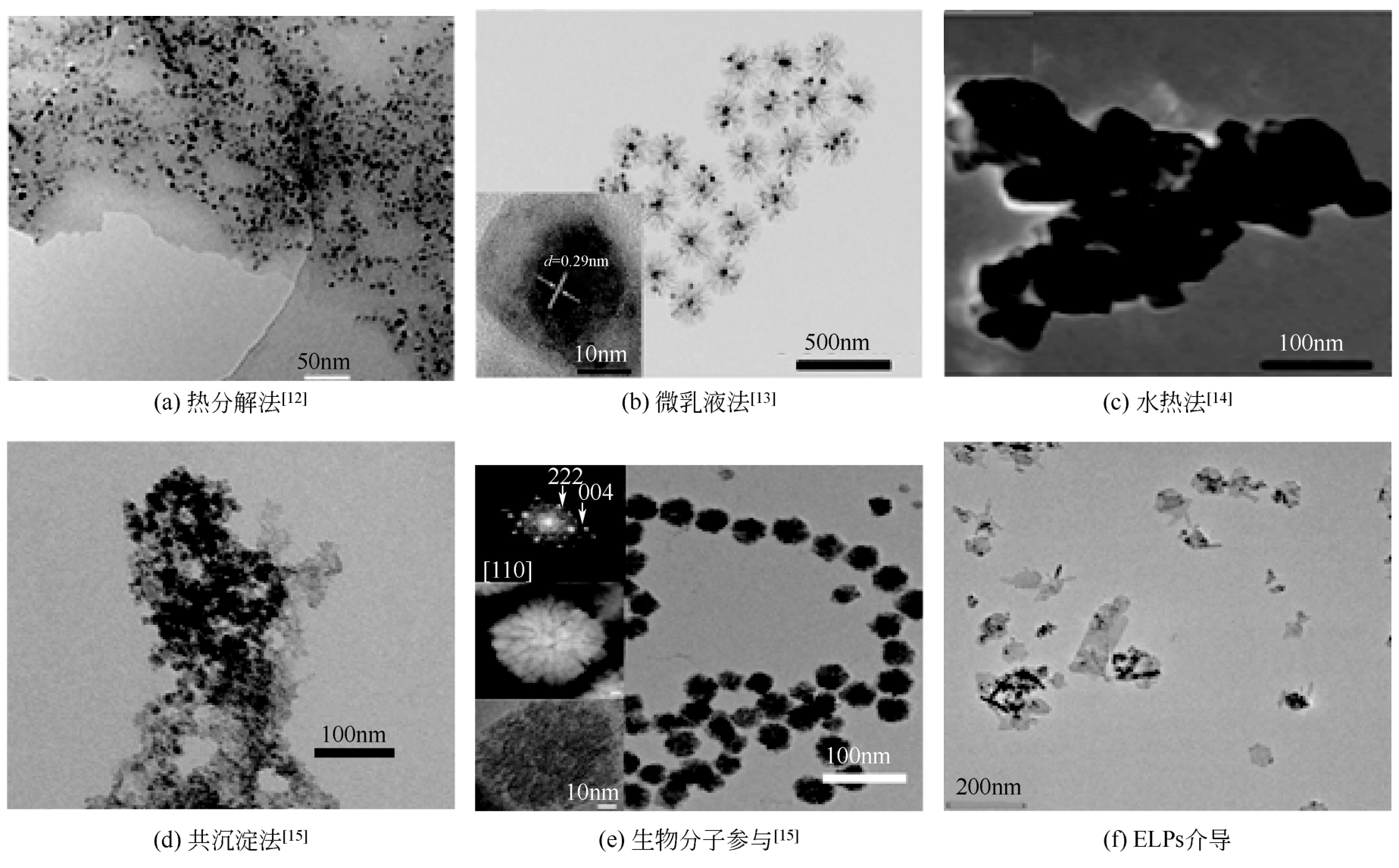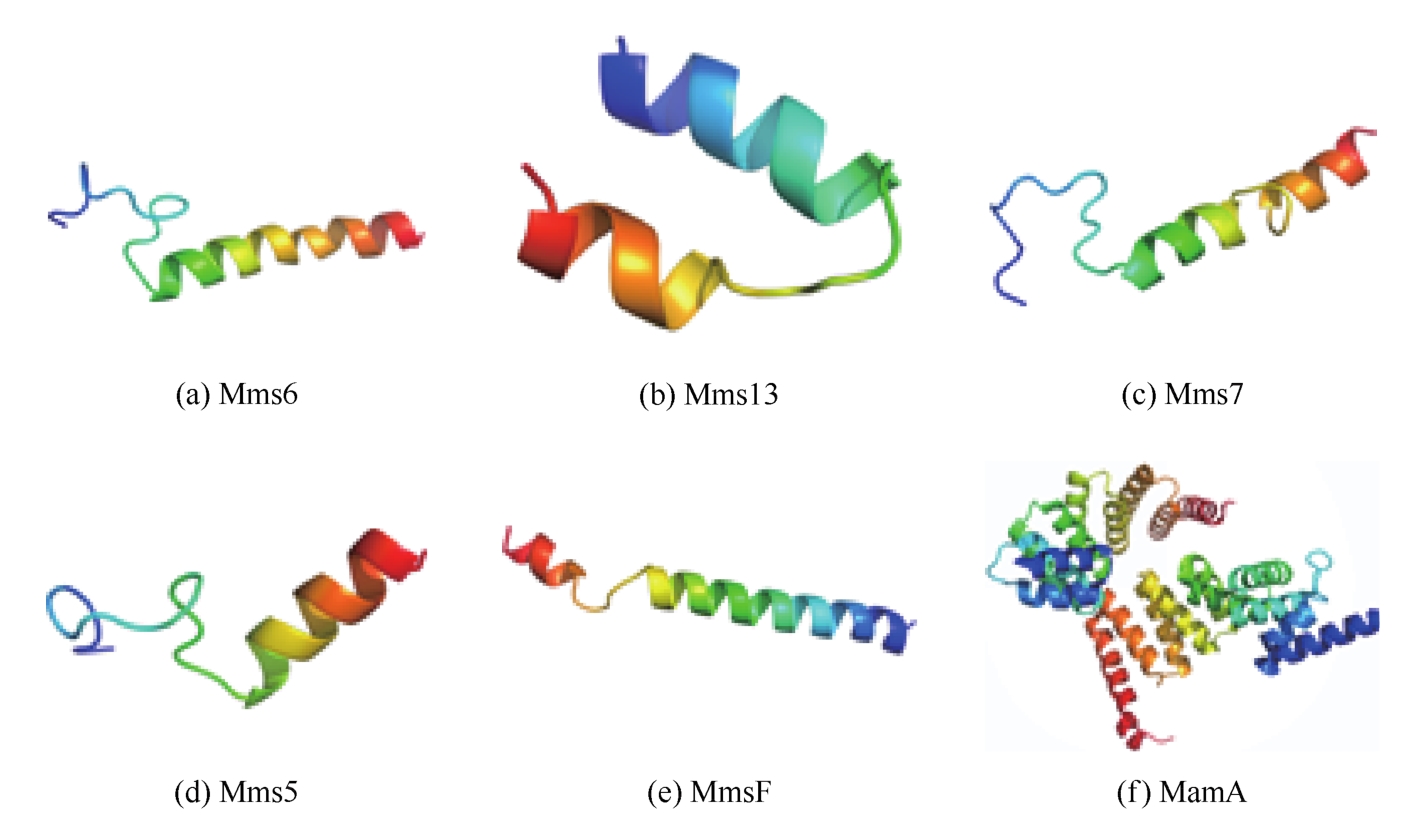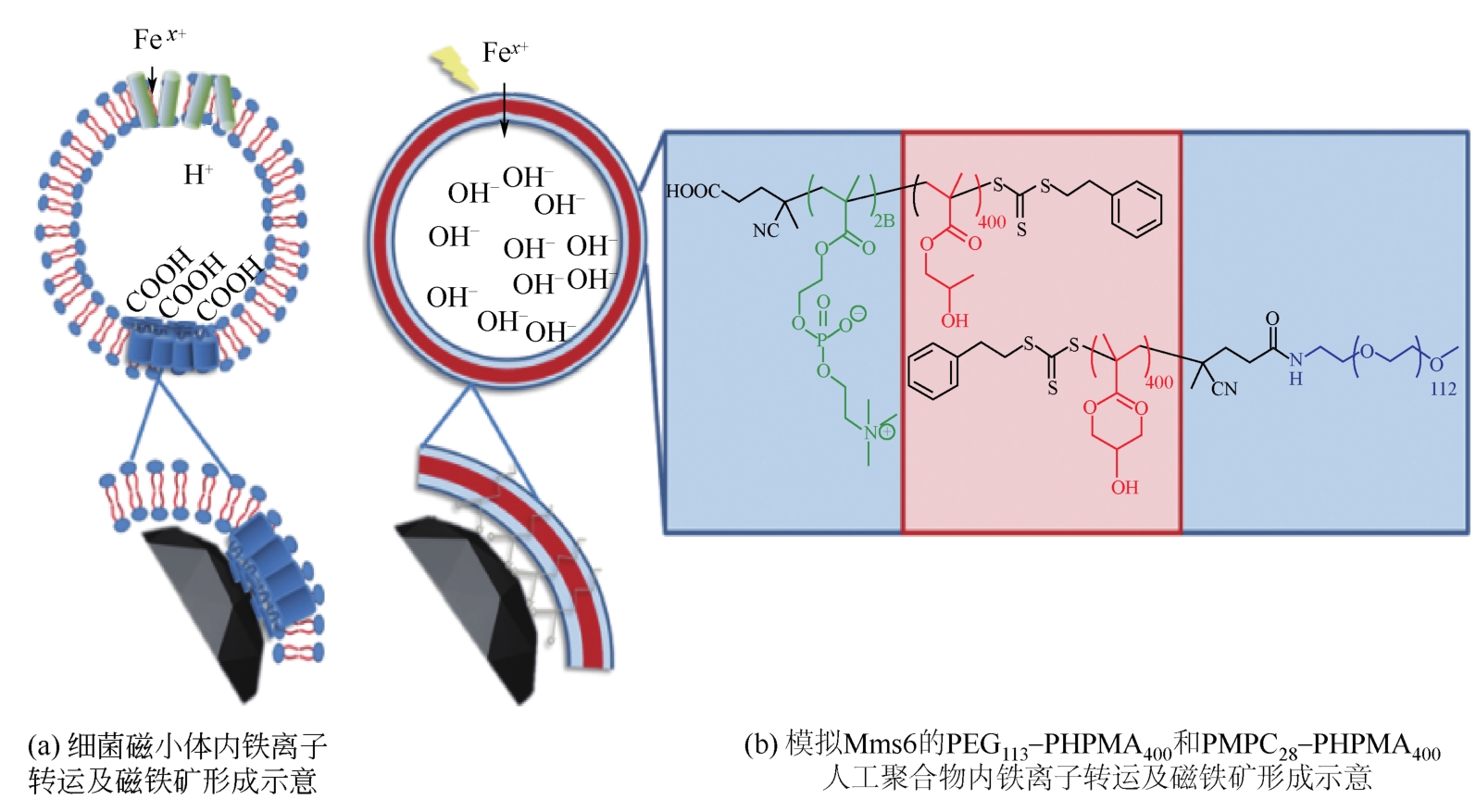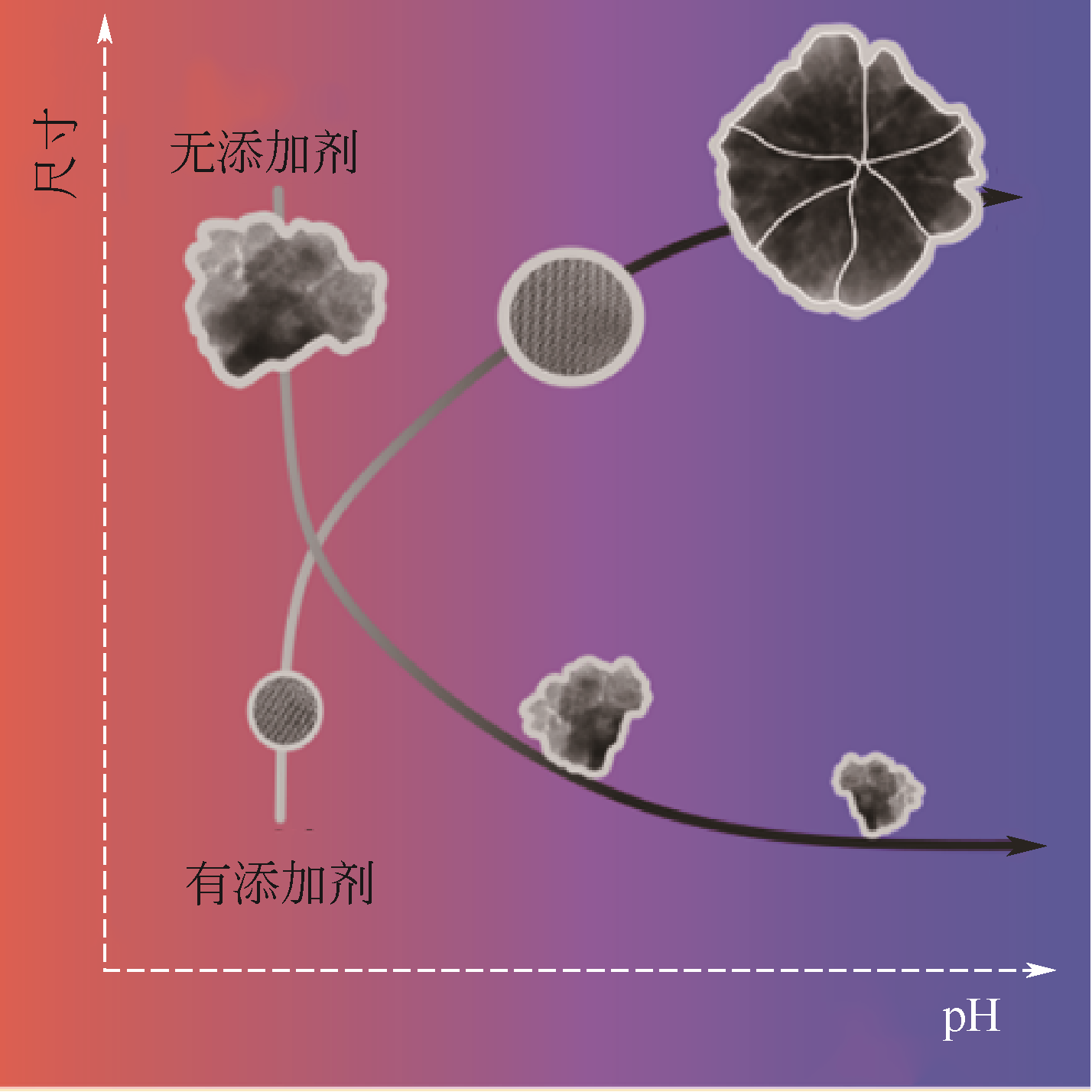Chemical Industry and Engineering Progress ›› 2021, Vol. 40 ›› Issue (5): 2719-2729.DOI: 10.16085/j.issn.1000-6613.2020-1165
• Biochemical and pharmaceutical engineering • Previous Articles Next Articles
Research progress of biomacromolecular-mediated biomimetic mineralization for the preparation of magnetic nanoparticles
ZHOU Yanhong( ), LI Xialan, ZHANG Guangya(
), LI Xialan, ZHANG Guangya( )
)
- College of Chemical Engineering, Huaqiao University, Xiamen 361021, Fujian, China
-
Received:2020-06-23Online:2021-05-24Published:2021-05-06 -
Contact:ZHANG Guangya
生物大分子介导仿生矿化制备磁性纳米粒子的研究进展
- 华侨大学化工学院,福建 厦门 361021
-
通讯作者:张光亚 -
作者简介:周雁红(1996—),女,硕士研究生,研究方向为纳米材料的仿生制备。E-mail:zhouyh1026@126.com 。 -
基金资助:国家自然科学基金(21376103);福建省自然科学基金(2020J01079);华侨大学研究生科研创新能力培育计划
CLC Number:
Cite this article
ZHOU Yanhong, LI Xialan, ZHANG Guangya. Research progress of biomacromolecular-mediated biomimetic mineralization for the preparation of magnetic nanoparticles[J]. Chemical Industry and Engineering Progress, 2021, 40(5): 2719-2729.
周雁红, 李夏兰, 张光亚. 生物大分子介导仿生矿化制备磁性纳米粒子的研究进展[J]. 化工进展, 2021, 40(5): 2719-2729.
share this article
Add to citation manager EndNote|Ris|BibTeX
URL: https://hgjz.cip.com.cn/EN/10.16085/j.issn.1000-6613.2020-1165
| 制备方法 | 反应条件 | 产物特点 | 形态 | 参考文献 |
|---|---|---|---|---|
| 热分解法 | 高温,需要添加稳定剂,操作复杂 | 高单分散性,粒径分布很窄,平均尺寸一般小于30nm | 由试剂比例、分解温度及熟化时间决定,形态可控,见 | [ |
| 微乳液法 | 需要有机复合物,操作复杂 | 单分散性,粒径分布较窄,平均尺寸一般大于30nm | 形态可控,见 | [ |
| 水热法 | 高温高压,操作简单 | 高单分散性,粒径分布很窄,平均尺寸一般大于100nm | 形态可控,见 | [ |
| 化学沉淀法 | 操作简单,在空气中反应 | 粒径分布较均匀,大小可控 | 由所用盐的种类、反应温度、Fe2+/Fe3+比例、pH及介质的离子强度决定,形态不易控制,见 | [ |
| 制备方法 | 反应条件 | 产物特点 | 形态 | 参考文献 |
|---|---|---|---|---|
| 热分解法 | 高温,需要添加稳定剂,操作复杂 | 高单分散性,粒径分布很窄,平均尺寸一般小于30nm | 由试剂比例、分解温度及熟化时间决定,形态可控,见 | [ |
| 微乳液法 | 需要有机复合物,操作复杂 | 单分散性,粒径分布较窄,平均尺寸一般大于30nm | 形态可控,见 | [ |
| 水热法 | 高温高压,操作简单 | 高单分散性,粒径分布很窄,平均尺寸一般大于100nm | 形态可控,见 | [ |
| 化学沉淀法 | 操作简单,在空气中反应 | 粒径分布较均匀,大小可控 | 由所用盐的种类、反应温度、Fe2+/Fe3+比例、pH及介质的离子强度决定,形态不易控制,见 | [ |
| 蛋白名称 | 结构特点 | 氨基酸组成 | 作用 | 参考文献 |
|---|---|---|---|---|
| Mms6 | 小分子膜蛋白(12500, pI 4.5),包括一个跨膜螺旋,如 | 主要由一个N端疏水区和含有多个酸性氨基酸的C端亲水区组成。C末端区域含有紧密的羧基和羟基,与铁离子结合。这些蛋白质N端具有共同的序列LGLGLGAWGPXXLGXXGXAGA。此外,中间和C端之间的区域含有一些共同的氨基酸,如赖氨酸(Lys)、酪氨酸(Tyr)和精氨酸(Arg) | 定位于磁小体,只存在于趋磁细菌中,与细菌磁铁矿晶体紧密结合。可以与铁离子结合,在成核和磁铁矿晶体生长过程中具有重要作用。其中,以重组蛋白形式表达的MamC和MamD会影响磁铁矿晶体的尺寸,缺失MamC和MamD会导致磁铁矿晶体尺寸的适度减小。 | [ |
| MamC(Mms13) | 小分子膜蛋白(12400, pI 7.2)有两个跨膜螺旋,由一个长度为21个残基的小肽连接,如 | [ | ||
| MamD(Mms7) | 小分子膜蛋白,7000,pI 5.9,如 | [ | ||
| MamG(Mms5) | 小分子膜蛋白,5000,pI 6.1,如 | [ | ||
| MmsF | MmsF包括3个跨膜螺旋,N端在细胞质中,而C端面对磁小体,如 | 磁小体内的环(C端和第一和第二螺旋之间的环)含有高度保守的残基 | 除MmsF会导致产生更小且畸形的磁小体,在控制形态方面至关重要。MmsF中的环状结构可以介导MmsF与矿物质或其他生物矿化蛋白的相互作用 | [ |
| Mms16(BMP膜特异性GTP酶) | — | — | BMP膜特异性Mms16启动细胞质膜的内陷,形成细胞内囊泡 | [ |
| 蛋白名称 | 结构特点 | 氨基酸组成 | 作用 | 参考文献 |
|---|---|---|---|---|
| Mms6 | 小分子膜蛋白(12500, pI 4.5),包括一个跨膜螺旋,如 | 主要由一个N端疏水区和含有多个酸性氨基酸的C端亲水区组成。C末端区域含有紧密的羧基和羟基,与铁离子结合。这些蛋白质N端具有共同的序列LGLGLGAWGPXXLGXXGXAGA。此外,中间和C端之间的区域含有一些共同的氨基酸,如赖氨酸(Lys)、酪氨酸(Tyr)和精氨酸(Arg) | 定位于磁小体,只存在于趋磁细菌中,与细菌磁铁矿晶体紧密结合。可以与铁离子结合,在成核和磁铁矿晶体生长过程中具有重要作用。其中,以重组蛋白形式表达的MamC和MamD会影响磁铁矿晶体的尺寸,缺失MamC和MamD会导致磁铁矿晶体尺寸的适度减小。 | [ |
| MamC(Mms13) | 小分子膜蛋白(12400, pI 7.2)有两个跨膜螺旋,由一个长度为21个残基的小肽连接,如 | [ | ||
| MamD(Mms7) | 小分子膜蛋白,7000,pI 5.9,如 | [ | ||
| MamG(Mms5) | 小分子膜蛋白,5000,pI 6.1,如 | [ | ||
| MmsF | MmsF包括3个跨膜螺旋,N端在细胞质中,而C端面对磁小体,如 | 磁小体内的环(C端和第一和第二螺旋之间的环)含有高度保守的残基 | 除MmsF会导致产生更小且畸形的磁小体,在控制形态方面至关重要。MmsF中的环状结构可以介导MmsF与矿物质或其他生物矿化蛋白的相互作用 | [ |
| Mms16(BMP膜特异性GTP酶) | — | — | BMP膜特异性Mms16启动细胞质膜的内陷,形成细胞内囊泡 | [ |
| 1 | DAVID L M, JASON T A, MOISE N, et al. Toward a structure determination method for biomineral-associated protein using combined solid-state NMR and computational structure prediction[J]. Structure, 2010, 18(12): 1678-1687. |
| 2 | DARJA L, ALENKA M. Anisotropic magnetic nanoparticles: a review of their properties, syntheses and potential applications[J]. Prog. Mater. Sci., 2018, 95(5): 286-328. |
| 3 | NUDELMAN F, SOMMERDIJK N A. Biomineralization as an inspiration for materials chemistry[J]. Angew. Chem. Int. Ed., 2012, 51(27): 6582-6596. |
| 4 | MALDONADO C L, UNNI M, RINALDI C. Magnetic characterization of iron oxide nanoparticles for biomedical applications[J]. Methods Mol. Biol., 2017, 1570: 47-71. |
| 5 | AHN J M, SUNG H J, YOON Y H, et al. Integrated glycoproteomics demonstrates fucosylated serum paraoxonase 1 alterations in small cell lung cancer[J]. Mol. Cell. Proteomics., 2014, 13(1): 30-48. |
| 6 | XIA S, KANCHANAWONG P. Nanoscale mechanobiology of cell adhesions[J]. Semin. Cell Dev. Biol., 2017, 71: 53-67. |
| 7 | LUO Z, ZHENG K, XIE J. Engineering ultrasmall water-soluble gold and silver nanoclusters for biomedical applications[J]. Chem. Commun., 2014, 50(40): 5143-5155. |
| 8 | VALVERDE T C, MONTALBAN L M, PEREZ G T, et al. Size control of in vitro synthesized magnetite crystals by the MamC protein of Magnetococcus marinusstrain MC-1[J]. Appl. Microbiol. Biotechnol., 2015, 99(12): 5109-5121. |
| 9 | LENDERS J M, ZOPE H R, YAMAGISHI A, et al. Bioinspired magnetite crystallization directed by random copolypeptides[J]. Adv. Funct. Mater., 2015, 25(5):711-719. |
| 10 | SHEN L, QIAO Y, GUO Y, et al. Facile co-precipitation synthesis of shape-controlled magnetite nanoparticles[J]. Ceram. Int., 2014, 40(1):1519-1524. |
| 11 | AKBARZADEH A, SAMIEI M, DAVARAN S. Magnetic nanoparticles: preparation, physical properties, and applications in biomedicine[J]. Nanoscale Res. Lett., 2012, 7(1): 144-150. |
| 12 | THIMIRI G R D B, KHAN NA, VENKATACHALAM S, et al. Step-by-step protocol for superparamagnetic nanoparticle-based endosome and lysosome isolation from eukaryotic cell[J]. Methods Mol. Biol., 2020, 2125: 167-172. |
| 13 | DAI Y, YANG D, YU D, et al. Engineering of monodisperse core-shell up-conversion dendritic mesoporous silica nanocomposites with a tunable pore size[J]. Nanoscale, 2020, 12(8): 5075-5083. |
| 14 | TANIGUCHI T, WATANEBE T, ICHINOHE S, et al. Nanoscale heterogeneities in CeO2-ZrO2 nanocrystals highlighted by UV-resonant Raman spectroscopy[J]. Nanoscale, 2010, 2(8): 1426-1428. |
| 15 | XIE Y, ZENG P, SIEGEL R A, et al. Magnetic deposition of aerosols composed of aggregated superparamagnetic nanoparticles[J]. Pharm. Res., 2010, 27(5): 855-865. |
| 16 | LI W, FORTNER J D. (Super)paramagnetic nanoparticles as platform materials for environmental applications: from synthesis to demonstration[J]. Front. Environ. Sci. Eng., 2020, 14(5): 77. |
| 17 | ASAB G, ZEREFFA E A, ABDO S T. Synthesis of silica-coated Fe3O4 nanoparticles by microemulsion method: characterization and evaluation of antimicrobial activity[J]. Int. J. Biomater., DOI: 10.1155/2020/4783612. |
| 18 | ANUSHREE C, PHILIP J. A novel approach to enhance high temperature thermal stability of superparamagnetic Fe3O4 nanoparticles[J]. J. Nanosci. Nanotechnol., 2019, 19(9): 5624-5632. |
| 19 | JIANG Z, LIU Q, DEKKERS M J, et al. Control of earth-like magnetic fields on the transformation of ferrihydrite to hematite and goethite[J]. Sci. Rep., 2016, 6: 30395. |
| 20 | HUANG S, CAO P, LI Y, et al. Nucleation and crystallization kinetics of a multicomponent lithium disilicate glass by in situ and real-time synchrotron X-ray diffraction[J]. Cryst. Growth. Des., 2013, 13(9): 4031-4038. |
| 21 | ZHANG C, DU C, LIAO J Y, et al. Synthesis of magnetite hybrid nanocomplexes to eliminate bacteria and enhance biofilm disruption[J]. Biomater. Sci., 2019, 7(7): 2833-2840. |
| 22 | GRUSKIENE R, KRIVOROTOVA T, STANEVICIENE R, et al. Preparation and characterization of iron oxide magnetic nanoparticles functionalized by nisin[J]. Colloid Surfaces B, 2018, 169: 126-134. |
| 23 | GULIZ Ak, AKSU D, APKN E, et al. Delivery of pemetrexed by magnetic nanoparticles: design, characterization, in vitro and in vivo assessment[J]. Prep. Biochem. Biotechnol., 2020, 50(3): 215-225. |
| 24 | AHN T, KIM J H, YANG H M, et al. Formation pathways of magnetite nanoparticles by coprecipitation method[J]. J. Phys. Chem. C, 2012, 116(10): 6069-6076. |
| 25 | LIN J, WANG X, TANG R. Regulations of organism by materials: a new understanding of biological inorganic chemistry[J]. J. Biol. Inorg. Chem., 2019, 24(4): 467-481. |
| 26 | MURSHED M. Mechanism of bone mineralization[J]. Cold Spring Harb. Perspect. Med., 2018, 8(12): a031229. |
| 27 | PAWOLSKI D, HEINTZE C, MEY I, et al. Reconstituting the formation of hierarchically porous silica patterns using diatom biomolecules[J]. J. Struct. Biol., 2018, 204(1): 64-74. |
| 28 | KOTZSCH A, GROGER P, PAWOLSKI D, et al. Silicanin-1 is a conserved diatom membrane protein involved in silica biomineralization[J]. BMC Biol., 2017, 15(1): 65. |
| 29 | KRAJINA B A, PROCTOR A C, SCHOEN A P, et al. Biotemplated synthesis of inorganic materials: an emerging paradigm for nanomaterial synthesis inspired by nature[J]. Prog. Mater. Sci., 2018, 91(1): 1-23. |
| 30 | GILBERT P U P A, PPRTER S M, SUN C Y, et al. Biomineralization by particle attachment in early animals[J]. Proc. Natl. Acad. Sci. USA, 2019, 116(36): 17659-17665. |
| 31 | MCCAUSLAND HC, KOMEILI A. Magnetic genes: studying the genetics of biomineralization in magnetotactic bacteria[J]. PLoS Genet., 2020, 16(2): e1008499. |
| 32 | MAEDA K, KOBAYASHI Y, KOIDE M, et al. The regulation of bone metabolism and disorders by wnt signaling[J]. Int. J. Mol. Sci., 2019, 20(22): 5525. |
| 33 | POHL A, BERGER F, SULLAN R M A, et al. Decoding biomineralization: interaction of a Mad10-derived peptide with magnetite thin films[J]. Nano Lett., 2019, 19(11): 8207-8215. |
| 34 | THOMAS J, WORCH H, KRUPPKE B, et al. Contribution to understand the biomineralization of bones[J]. J. Bone. Miner. Metab., 2020, 38(4): 456-468. |
| 35 | FANG P A, CONWAY J F, MARGOLIS H C, et al. Hierarchical self-assembly of amelogenin and the regulation of biomineralization at the nanoscale[J]. Proc. Natl. Acad. Sci. USA, 2011, 108(34): 14097-14102. |
| 36 | PEIGNEUX A, JABALERA Y, VIVAS M A F, et al. Tuning properties of biomimetic magnetic nanoparticles by combining magnetosome associated proteins[J]. Sci. Rep, 2019, 9(1): 8804. |
| 37 | ARAKAKI A, WEBB J, MATSUNAGA T. A novel protein tightly bound to bacterial magnetic particles in Magnetospirillum magneticum strain AMB-1[J]. J. Biol. Chem., 2003, 278(10): 8745-8750. |
| 38 | YAMAGISHI A, NARUMIYA K, TANAKA M, et al. Core amino acid residues in the morphology-regulating protein, Mms6, for intracellular magnetite biomineralization[J]. Sci. Rep., 2016, 6(1): 35670. |
| 39 | LENDERS, JOS J M, BAWAZER, et al. Combinatorial evolution of biomimetic magnetite nanoparticles[J]. Adv. Funct. Mater., 2017, 27(10): 1604863. |
| 40 | RAWLINGS A E, SOMNER L A, FITZPATRICK M M, et al. Artificial coiled coil biomineralisation protein for the synthesis of magnetic nanoparticles[J]. Nat. Commun., 2019, 10(1): 2873. |
| 41 | WOOD R. Exploring the drivers of early biomineralization[J]. Emerg. Top. Life Sci., 2018, 2(2): 201-212. |
| 42 | BARBOSA P F, LAGOEIRO L. Crystallographic texture of the magnetite-hematite transformation: evidence for topotactic relationships in natural samples from Quadrilatero Ferrifero, Brazil[J]. Am. Mineral., 2010, 95(1): 118-125. |
| 43 | BAIN J, LEGGE C J, BEATTIE D L, et al. A biomimetic magnetosome: formation of iron oxide within carboxylic acid terminated polymersomes[J]. Nanoscale, 2019, 11(24): 11617-11625. |
| 44 | ARAKAKI A, MASUDA F, AMEMIYA Y, et al. Control of the morphology and size of magnetite particles with peptides mimicking the Mms6 protein from magnetotactic bacteria[J]. J. Colloid Interface Sci., 2010, 343(1): 65-70. |
| 45 | GALLOWAY J M, BRAMBLE J P, RAWLINGS A E, et al. Biotemplated magnetic nanoparticle arrays[J]. Small, 2012, 8(2): 204-208. |
| 46 | BIRD S M, GALLOWAY J M, RAWLINGS A E, et al. Taking a hard line with biotemplating: cobalt-doped magnetite magnetic nanoparticle arrays[J]. Nanoscale, 2015, 7(16): 7340-7351. |
| 47 | MURAT D, FALAHATI V, BERTINETTI L, et al. The magnetosome membrane protein, MmsF, is a major regulator of magnetite biomineralization in Magnetospirillum magneticum AMB-1[J]. Mol. Microbiol., 2012, 85(4): 684-699. |
| 48 | BERNSTEIN E F, SARKAS H W, BOLAND P, et al. Beyond sun protection factor: an approach to environmental protection with novel mineral coatings in a vehicle containing a blend of skincare ingredients[J]. J. Cosmet. Dermatol., 2020, 19(2): 407-415. |
| 49 | TARTAJ P, MORALES M P, GONZALEZ C T, et al. The iron oxides strike back: from biomedical applications to energy storage devices and photoelectrochemical water splitting[J]. Adv. Mater., 2011, 23(44): 5243-5249. |
| 50 | CHATZIDAKIS M, PRABHUDEV S, SAIDI P, et al. Bulk immiscibility at the edge of the nanoscale[J]. ACS Nano, 2017, 11(11):10984-10991. |
| 51 | FANG G, CHEN H, ZHANG Y, et al. Immobilization of pectinase onto Fe3O4@SiO2-NH2 and its activity and stability[J]. Int. J. Biol. Macromol., 2016, 88: 189-195. |
| 52 | DEY A, LENDERS J J M, SOMMERDIJK N A J M. Bioinspired magnetite formation from a disordered ferrihydrite-derived precursor[J]. Faraday Discussions, 2015, 179: 215-225. |
| 53 | GORDON L M, ROMAN J K, EVERLY R M, et al. Selective formation of metastable ferrihydrite in the chiton tooth[J]. Angew. Chem. Int. Ed., 2014, 53(43): 11506-11509. |
| 54 | BAUMGARTNER J, DEY A, BOMANS P H, et al. Nucleation and growth of magnetite from solution[J]. Nat. Mater., 2013, 12(4): 310-314. |
| 55 | LIU L, PU X, YIN G, et al. Biomimetic mineralization of magnetic iron oxide nanoparticles mediated by bi-functional copolypeptides[J]. Molecules, 2019, 24(7): E1401. |
| 56 | LENDERS J J M, ALTAN C L, BOMANS P H H, et al. A bioinspired coprecipitation method for the controlled synthesis of magnetite nanoparticles[J]. Cryst. Growth Des., 2014, 14(11): 5561-5568. |
| 57 | KUHRTS L, MACIAS S E, TARAKINA N V, et al. Shaping magnetite with poly-L-arginine and pH: from small single crystals to large mesocrystals[J]. J. Phys. Chem., Lett., 2019, 10(18): 5514-5518. |
| 58 | WANG Y, ZHANG X Y, LUO Y L, et al. Dual stimuli-responsive Fe3O4 graft poly(acrylic acid)-block-poly(2-methacryloyloxyethyl ferrocenecarboxylate) copolymer micromicelles: surface RAFT synthesis, self-assembly and drug release applications[J]. J. Nanobiotechnology, 2017, 15(1): 76. |
| 59 | ZHANG K, WANG Z, LI Y, et al. Dual stimuli-responsive N-phthaloylchitosan-graft-(poly(N-isopropylacrylamide)-block-poly(acrylic acid)) copolymer prepared via RAFT polymerization[J]. Carbohydr. Polym., 2013, 92(1): 662-667. |
| 60 | LENDERS J J M, MIRABELLO G, SOMMERDIJK N A J M. Bioinspired magnetite synthesis via solid precursor phases[J]. Chem. Sci. 2016, 7(9): 5624-5634. |
| 61 | WANG X Z, GE H H, ZHANG D D, et al. Oligomerization triggered by foldon: a simple method to enhance the catalytic efficiency of lichenase and xylanase[J]. BMC Biotechnology, 2017, 17(1): 57. |
| 62 | LI C C, ZHANG G Y. The fusions of elastin-like polypeptides and xylanase self-assembled into insoluble active xylanase particles[J]. Journal of Biotechnology, 2014, 177: 60-66. |
| 63 | LIN Y Q, ZHANG G Y. Target-specific covalent immobilization of enzymes from cell lysate on SiO2 nanoparticles for biomass saccharification[J]. ACS Appl. Nano Mater., 2020, 3(1): 44-48. |
| 64 | 邱岳, 林源清, 罗少凡, 等. 类弹性蛋白多肽介导的二氧化硅仿生矿化[J]. 科学通报, 2018, 63(S2): 3037-3046. |
| QIU Y, LIN Y Q, LUO S F, et al. Elastase-like polypeptides mediated biomineralization of silica[J]. Chinese Science Bulletin, 2018, 63(S2): 3037-3046. | |
| 65 | QIU Y, LIN Y, ZHANG G Y. Unique silica biomimetic mineralization of acidic elastin-like polypeptides without hydroxyl and charged residues[J]. Int. J. Biol. Macromol., 2020, 153: 224-231. |
| 66 | LE D H T, SUGAWARA-NARUTAKI A. Elastin-like polypeptides as building motifs toward designing functional nanobiomaterials[J]. Mol. Syst. Des. Eng., 2019, 4: 545-565. |
| 67 | MOHAPATRA M, ANAND S. Synthesis and applications of nano-structured iron oxides/hydroxides—A review[J]. Int. J. Eng. Sci., 2011, 2: 127-146. |
| 68 | PATWARDHAN S V. Biomimetic and bioinspired silica: recent developments and applications[J]. Chem. Commun., 2011, 47(27): 7567-7582. |
| 69 | ABDELHAMID M A A, PACK S P. Biomimetic and bioinspired silicifications: recent advances for biomaterial design and applications[J]. Acta Biomater., 2021, 120: 38-56. |
| 70 | STREHL C, MAURIZI L, GABER T, et al. Modification of the surface of superparamagnetic iron oxide nanoparticles to enable their safe application in humans[J]. Int. J. Nanomed., 2016, 11: 5883-5896. |
| 71 | WANG L, HUANG J, CHEN H, et al. Exerting enhanced permeability and retention effect driven delivery by ultrafine iron oxide nanoparticles with T1-T2 switchable magnetic resonance imaging contrast[J]. ACS Nano, 2017, 11: 4582-4592. |
| 72 | DAS A, SINGH J, YOGALAKSHMI K N. Laccase immobilized magnetic iron nanoparticles: fabrication and its performance evaluation in chlorpyrifos degradation[J]. Int. Biodeterior. Biodegrad., 2017, 117: 183-189. |
| 73 | GUO M, WENG X, WANG T, Chen Z, et al. Biosynthesized iron-based nanoparticles used as a heterogeneous catalyst for the removal of 2,4-dichlorophenol[J]. Separ. Purif. Technol., 2017, 175: 222-228. |
| 74 | HUANG P H, ZHAO S, BACHMAN H, et al. Acoustofluidic synthesis of particulate nanomaterials[J]. Adv. Sci., 2019, 6(19): 1900913. |
| 75 | AJINKYA N, YU X F, KAITHAL P, et al. Magnetic iron oxide nanoparticle (IONP) synthesis to applications: present and future[J]. Materials, 2020, 13(20): 4644. |
| [1] | CHU Tiantian, LIU Runzhu, DU Gaohua, MA Jiahao, ZHANG Xiao’a, WANG Chengzhong, ZHANG Junying. Preparation and chemical degradability of organoguanidine-catalyzed dehydrogenation type RTV silicone rubbers [J]. Chemical Industry and Engineering Progress, 2023, 42(7): 3664-3673. |
| [2] | OUYANG Sufang, ZHOU Daowei, HUANG Wei, JIA Feng. Research progress on novel anti-migration rubber antioxidants [J]. Chemical Industry and Engineering Progress, 2023, 42(7): 3708-3719. |
| [3] | XI Huimin, QIAN Kun, YU Kejing, LI Jie, ZHANG Zhongwei, XIONG Ziming, ZHANG Yaoliang. Preparation, modification and application of self-healing polyurethane elastomers based on disulfide and hydrogen bonds [J]. Chemical Industry and Engineering Progress, 2023, 42(2): 934-943. |
| [4] | JI Xuanyu, LIN Weijian, ZHOU Xiong, BAI Jisong, YANG Yu, KONG Jie, LIAO Chongyang. Research status and progress of waste tire pyrolysis technology [J]. Chemical Industry and Engineering Progress, 2022, 41(8): 4498-4512. |
| [5] | TAO Li, YANG Qirong, LI Zhaoying, QI Hao, WANG Liwei, MA Xinru. Mechanism of hydrogen production by catalytic pyrolysis of tire rubber based on molecular dynamics simulation [J]. Chemical Industry and Engineering Progress, 2022, 41(6): 3010-3021. |
| [6] | MA Xingxing, FENG Yakai. Improvement of thermal oxygen aging resistance of silicon gel by adding modified cerium oxide with coupling agent [J]. Chemical Industry and Engineering Progress, 2022, 41(2): 874-880. |
| [7] | YU Shuangpeng, YANG Qirong, TAO Li, LIU Ting, DU Wei, YAO Erren. Gas phase pyrolysis products of tire rubber based on molecular dynamics simulation [J]. Chemical Industry and Engineering Progress, 2021, 40(6): 3119-3131. |
| [8] | Yulong WANG, Guosheng HU, Jingting ZHANG, Jingjing BAI, Qinniu LYU, Zhenzhong LI. Development of self-healing poly(urethane urea) with high performances based on the synergistic effect of disulfide bonds and hydrogen bonds [J]. Chemical Industry and Engineering Progress, 2021, 40(1): 324-331. |
| [9] | Wenyu WANG, Ruibao DONG, Zhibo LI, Guangqin PAN. Liquid low molecular polyisoprene modified nitrile rubber foaming materials [J]. Chemical Industry and Engineering Progress, 2020, 39(8): 3230-3235. |
| [10] | Lianzhen LI,Linlin LI,Yong GUAN,Haitao LIU. Properies of polyurethane damping material with different inorganic filler [J]. Chemical Industry and Engineering Progress, 2019, 38(08): 3795-3800. |
| [11] | Lihong JIANG, Shuangshuang SONG, Deng PAN, Yaming WANG, Kun LIU, Yan’e ZHENG. Study on the properties of amorphous catalyst Ni-P/TiO2 for hydrogenation of α-pinene [J]. Chemical Industry and Engineering Progress, 2019, 38(06): 2768-2775. |
| [12] | Wei JIANG, Chao YANG, Shaojun YUAN, Bin LIANG. Bioinspired superhydrophobic metal materials: preparation methods and applications in chemical engineering [J]. Chemical Industry and Engineering Progress, 2019, 38(01): 344-364. |
| [13] | LI Zhaoshuang, LI Jianfang, LIU He, SHANG Shibin, SONG Zhanqian. Research progress of surface modification of antibacterial performance of biomedical silicone rubber [J]. Chemical Industry and Engineering Progress, 2018, 37(12): 4719-4725. |
| [14] | WANG Rongjie, SHEN Benxian, LIU Jichang, ZHAO Jigang. The properties of TBR tire belt produced from cleaning insoluble sulfur [J]. Chemical Industry and Engineering Progress, 2018, 37(06): 2432-2437. |
| [15] | LI Bo-Geng, ZHANG Mingxuan, LIU Weifeng, WANG Wenjun. State-of-the-art and research progress of polyolefin-based elastomer [J]. Chemical Industry and Engineering Progress, 2017, 36(09): 3135-3144. |
| Viewed | ||||||
|
Full text |
|
|||||
|
Abstract |
|
|||||



